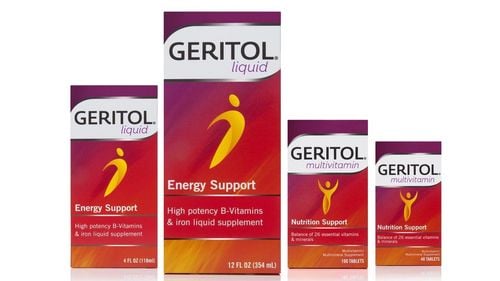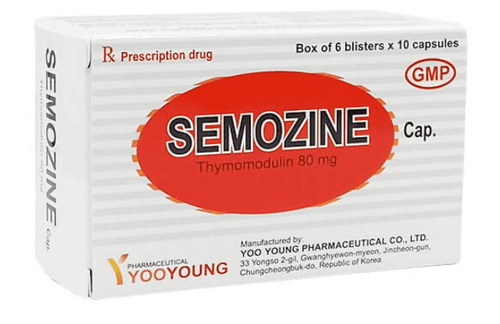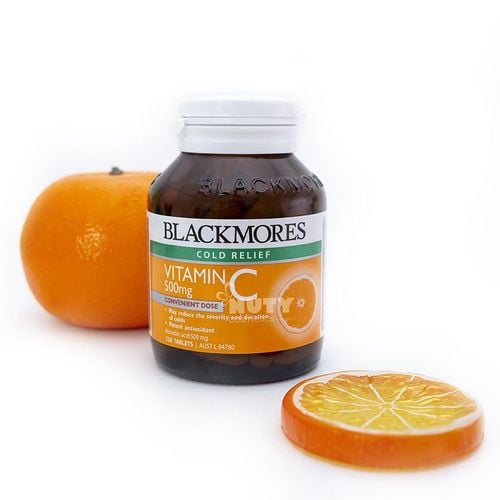This is an automatically translated article.
Ribomin belongs to the group of mineral and vitamin drugs that provide vitamins for the body, help strengthen the immune system, and help children develop comprehensively both physically and mentally. Ribomin is often used in cases where children are in the growing age, prevention and vitamin supplementation during the recovery period,... However, the drug can cause some side effects during treatment. What are the side effects of Ribomin?1. What is Ribomin?
Ribomin medicine belongs to the group of mineral and vitamin drugs including the following ingredients:
Retinol Thiamin hydrochloride Riboflavin sodium phosphate Pyridoxine HCL Cyanocobalamin Ascorbic acid Cholecalciferol Alpha tocopheryl acetate Nicotinamide Calcium D-patothenate What effect does Ribomin have? Ribomin has the effect of strengthening the body's immunity, helping children to develop comprehensively both physically and mentally. Ribomin is well absorbed from the gastrointestinal tract and widely distributed in body tissues, metabolised mainly by the liver and eliminated by the kidneys, partly in the bile.
2. Indications and contraindications of Ribomin
2.1 Indications for the use of Ribomin Indication for the use of Ribomin in the following cases:
Supplementing with vitamins necessary for the body in the growing age of children Supplementing and preventing vitamin deficiency when the diet is not adequate nutrition or the recovery period after illness. Supplementing vitamins during the period when the body needs more vitamins and especially during the changing seasons. 2.2 Contraindication to the use of Ribomin The contraindications to the use of Ribomin include:
Hypersensitivity to any ingredient in the drug Infants Malignant neoplasms Severe liver disease Progressive gastric ulcer Hemorrhagic Vascular Severe hypotension. Patients with atopic conditions such as asthma
3. Usage and dosage of Ribomin
Ribomin is prepared as a powder for oral suspension and needs to be dissolved in 30ml of warm boiled water. Dosage of Ribomin will depend on the condition and age of the patient, the usual dose is 1-2 packs/day.
Use Ribomin regularly to get the most benefit from it. To use this medicine safely, take Ribomin exactly as directed by your doctor, do not use it more often, smaller or longer than prescribed. Absolutely do not abuse the drug for too long for a long time or arbitrarily increase the dose of the drug. Because this not only makes the condition worse, but also increases the risk of unwanted effects.
4. Undesirable effects when using Ribomin
Some unwanted effects that may occur when using Ribomin include:
Digestive disturbances Nausea, heartburn, redness of the skin In addition, some symptoms of overdose may occur such as:
Confusion Chronic vitamin A toxicity: weight loss, loss of appetite, agitation, fatigue, digestive disorders, hair loss, dry brittle hair, edema under the skin, visual disturbances,... Acute vitamin A poisoning: Drowsiness, dizziness, headache, diarrhea, agitation, etc. may appear from 6-24 hours after taking high dose. Vitamin D3 poisoning: hypercalcemia with manifestations such as nausea, headache, constipation, muscle pain, metallic taste in the mouth, decreased muscle tone,... Early manifestations such as kidney stones, kidney calcification , kidney damage,... Vitamin B6 poisoning: taking a dose of 2 grams/day for more than 30 days can cause sensory nerve syndrome, loss of coordination with gradual loss of coordination, loss of coordination. position awareness. Before prescribing a drug, a doctor always weighs the benefits and effects of Ribomin more than the risk of side effects. However, some cases when taking Ribomin can still occur unwanted effects. Therefore, when there are abnormal signs after taking the drug, the patient should immediately notify the medical staff for immediate intervention.
5. Some notes when using Ribomin
Some notes when using Ribomin include:
Inform your doctor about a history of allergy to Ribomin or any other allergies. Ribomin may contain inactive ingredients and could cause an allergic reaction or other serious problems. Report any medications you are taking including prescription and nonprescription drugs, herbs and supplements, foods, dyes or preservatives. Ribomin should be used with caution in children with high blood calcium levels, kidney dysfunction, kidney stones, diabetes, increased sarcoidosis, pregnant and lactating women, hypoparathyroidism,. .. Do not use more than 5000UI vitamin A per day for pregnant women Closely monitor when using high doses of nicotiamide for cases with a history of peptic ulcer, a history of jaundice or liver disease, gallbladder disease, gout, gouty arthritis, diabetes. For pregnant and lactating women, the daily required dose does not affect the fetus and nursing infant. However, when taking high doses of vitamin A can cause teratogenic conditions, hypercalcemia during pregnancy can cause some diseases such as aortic valve stenosis, hypoparathyroidism, mental retardation. and fitness in children. If you forget to take a dose, take the missed dose as soon as possible. However, if it is almost time for the next dose, skip the missed dose and continue taking the medicine as scheduled. Do not arbitrarily use the drug twice the dose more than the treatment regimen.
6. Drug interactions
Drug interactions can reduce the effect of Ribomin, or increase the effect of unwanted effects. Tell your doctor about all other medicines you are taking.
Some drugs that can interact with Ribomin include:
Probenecid reduces the absorption of riboflavin in the stomach and intestines Diuretics increase the excretion of riboflavin Cholestyramine, phenytoin, levodopa reduce the absorption of vitamin D3, vitamin E Concomitant use of vitamin PP with HGM-CoA reductase inhibitors, hypoglycemic agents or insulin, alpha-adrenergic blockers, hepatotoxic drugs, carbamazepine. Isoniazid Acetylsalicylic Acid Warfarin and other anticoagulants To ensure the quality of the drug, it is necessary to store Ribomin at room temperature, away from light and away from moisture. Do not store Ribomin in a humid place or in the freezer. Keep Ribomin out of the reach of children and family pets. When the medicine has been damaged, it cannot be used anymore or has expired, please dispose of the medicine according to the correct procedure. Do not arbitrarily dispose of Ribomin into the environment such as water pipes or toilets unless requested.
In short, Ribomin belongs to the group of mineral and vitamin drugs that provide vitamins for the body, help strengthen the immune system, and help children develop comprehensively both physically and mentally. Ribomin is often used in cases of children in the growing age, prophylaxis and vitamin supplementation during the recovery period,... However, Ribomin can cause some unwanted effects and drug interactions. , so tell your doctor what medicines you are taking to reduce the risk of side effects and at the same time increase the effectiveness of the treatment process.
Follow Vinmec International General Hospital website to get more health, nutrition and beauty information to protect the health of yourself and your loved ones in your family.
Please dial HOTLINE for more information or register for an appointment HERE. Download MyVinmec app to make appointments faster and to manage your bookings easily.













